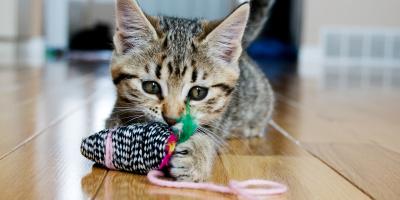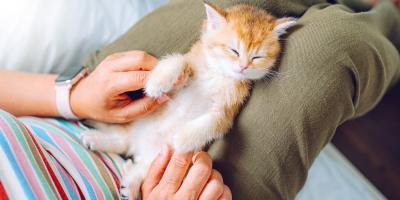Sickness in Kittens: Understanding and Identifying Common Kitten Illnesses


You might be asking yourself: My kitten is sick! What should I do?
Whether you’re caring for your first baby kitten or you’ve benefited from the companionship of cats all your life, it can take you by surprise if you find your kitten looking under the weather.
Our kitten care experts share what you need to know about keeping kitten health in check. Learn the basics of sickness in kittens, including symptoms, treatment and prevention options.
Why Are Kittens Prone to Sickness?
As kittens grow and get used to the world around them, they’re delicate and more susceptible to getting sick than adult cats. Getting a kitten sick might be easier than you’d suspect. That’s because their bodies are sensitive to change, so they can quickly develop a range of illnesses.
Kitten diarrhea, for example, is a case of kitten sickness that can stem from stress due to environmental changes that range from moving to a new home to a newborn baby addition to the family. Other common kitten diarrhea causes may include:
- Drinking any milk other than milk replacer specially formulated for cats or kitten formula
- Overeating
- Consuming non-food items
- Allergies
- Colitis
- Any sudden dietary changes
- Tapeworms, roundworms and other intestinal parasites
- Salmonella, campylobacter and other bacterial infections
- Feline leukemia virus (FeLV), feline immunodeficiency virus (FIV), feline panleukopenia (FPV) and other viruses
Kittens can be picky eaters with selective appetites, which can be due to and be the cause of illnesses. Changes in food intake, including decreased food intake or no food intake, can occur for various reasons including:
- A narrow or deep food bowl
- A bowl in a crowded location, such as by other pets, people, foot traffic or the litter box
- An unclean bowl
- Stress due to environmental changes, including a new home and traveling
- Reactions to new vaccinations, typically mild
- Toothache or teething pain
- Upper respiratory infection
- New food
- New pets
- Being just plain finicky
Changes in diet can cause sickness in kittens, making them more susceptible to disease, low blood sugar and dehydration. For proper kitten health care, the kitten diet should be complete and balanced. You can introduce your kitten to various textures and forms. However, it’s best to do this gradually while monitoring their stool quality.
It’s important to note that in all cases where a kitten isn’t eating, you should seek veterinary care quickly.
How to Tell if a Kitten is Sick
Kitten illness symptoms can range from subtle to obvious. Signs of sick kitten concerns vary.
Understandably, you might still be asking yourself: How do I know if my kitten is sick?
Kittens of all types can be hard to read. Here are a few signs of a common sickness in kittens:
- Nasal Discharge: Kittens with upper respiratory bacterial infections may have a milky-colored nasal discharge of mucus and pus.
- Stopped Eating: As we shared above, if a kitten stops eating, call your vet immediately.
- Trouble Breathing: If your kitten seems to have trouble breathing, it’s also important to call your vet as soon as possible.
- Conjunctivitis: If your kitten is squeezing or holding its eyes closed, squinting or just rubbing at its eyes a lot, you should call your vet for an examination, as it may be a sign of cat conjunctivitis.
- Diarrhea: Mushy, liquid or shapeless stool may indicate diarrhea, though kittens have softer stool than adult cats. Consult with your vet if you’re not sure it’s diarrhea. Also, any kitten stool that’s not brown is cause for concern.
- Vomiting: Severe vomiting may accompany diarrhea, for which kittens need to seek veterinary care.
- Dehydration: Symptoms of dehydration can include vomiting, lethargy, constipation, dry gums, loss of skin elasticity and panting. If your kitten has these symptoms, they need immediate medical intervention.
- Low Blood Sugar: Another life-threatening condition for your kitten, symptoms include tremors, seizures, lethargy or weakness.
- Enlarged Abdomen and Dull Coat: These signs may point to intestinal parasites. Other symptoms of intestinal parasites may include a failure to thrive, diarrhea, vomiting or dehydration.
- Excessive Itchiness: A major flea infestation is more than just a horrible feeling for your kitten. It can also be the source of severe anemia and deadly disease, so it’s essential to work with your vet to figure out a plan to get rid of fleas and prevent further infestation.
Common Kitten Illnesses
A wide variety of diseases and illnesses can affect kittens, though here is the most common kitten illness to be aware of.
Feline Distemper
Also known as feline panleukopenia, or FPV, this virus is as widespread as it is dangerous and is a recommended core vaccine for kittens. It may cause life-endangering diarrhea, vomiting, dehydration, and sepsis. The virus also attacks the bone marrow, suppressing your kitten’s ability to fight the infection. Kittens affected typically need extensive veterinary care. The best treatment is currently prevention.
Feline Infectious Peritonitis (FIP)
A typically mild feline coronavirus can attack the digestive system. Kittens can catch it through waste and bodily fluids. The disease may mutate into FIP, at which point it becomes deadly as it attacks other organs. FIP is typically fatal, although new treatments are being investigated that show promise in helping these cats.
Intestinal Parasites
Kittens catch hookworms, roundworms and whipworms from a variety of ways specific to each parasite including ingesting feces or dirt-contaminated substances, often through regular grooming, nursing from an infected mother or consuming a prey animal. Ingesting fleas spreads tapeworms. Hookworms and roundworms cause more concern than tapeworms and whipworms. Symptoms of hookworms and roundworms may include severe anemia, stomach problems, respiratory signs and a distended abdomen. Your vet can provide the appropriate deworming treatment.
Giardia and Coccidia
These can also be contracted from ingesting contaminated substances and can reduce your kitten’s nutrient absorption. Symptoms may include loss of appetite, diarrhea, weakness or dehydration. Your vet can diagnose and treat these.
Feline Upper Respiratory Bacterial Infections
These may include mycoplasma, Chlamydophila and Bordetella, all with similar symptoms, including loss of appetite, coughing, nasal congestion, pink eye and sneezing. Your vet may prescribe antibiotics, though some cases lead to dehydration, which needs supportive care.
Feline Calicivirus (FCV)
FCV is a highly contagious disease that circulates commonly worldwide. While most recover, some cases are fatal. Symptoms may include crusting sores, congestion, appetite loss, eye drainage, fever, mild lameness, lethargy and tongue ulcers. Vaccines are available, but they might only reduce the severity of some cases.
Feline Pneumonia
Causes range from infections from bacteria, viruses or fungi to inhaling a foreign object. Symptoms may include congested breathing, coughing, fatigue, gagging, poor appetite and shortness of breath. Your kitten may need antibiotics, supportive care and possibly hospitalization.
Feline Viral Rhinotracheitis (FVR)
Caused by feline herpesvirus 1 (FHV-1), FVR is one of the most common diseases in kittens. The disease causes kitten immune system concerns. A kitten can harbor the virus and then risk experiencing symptoms again later in life when their immune system suffers. The symptoms include congestion, eye issues, poor appetite, sneezing and tiredness. Your vet may prescribe antibiotics for secondary infections, antiviral drops, topical eye medicine or an L-lysine supplement.
Flea Infestations
Preventing a flea infestation is much easier than eliminating one. Preventative medicine can do the trick. As mentioned above, kittens may easily catch other diseases from fleas or develop anemia. A combination of oral medication and pet-safe flea treatments is the solution to clearing an already-present infestation.
Feline Scabies (Mange)
Mites on kittens can cause mange, commonly on outdoor cats in warm, urban U.S. regions. It causes excessive itchiness, bald spots, crusting or scabs. Your vet can test for it with a painless skin scraping and treat it with prescription medication, as well as possibly corticosteroids for inflammation and antibiotics for any infections.
Feline Ticks
Ticks may cause illnesses such as Cytauxzoonosis and Babesiosis. Cats that live outside in wooded areas are at an increased risk of infection. You can regularly brush your kitten to look for any ticks. Call your vet right away if you find any.
Feline Ringworm
This is a feline fungal infection that can look like scaly or bald patches (typically on a kitten’s feet, face, tail or ear tips), larger open sores or minor bumps. It’s spread via contaminated surfaces; your vet can recommend a fungal treatment.
Atopic Dermatitis
Anything your kitten might be allergic to, including but not limited to dust mites, food, mold, pollen or tobacco smoke, can cause atopic dermatitis. Symptoms may occur after your kitten is six months of age and might include hair loss, excessive itching, raised plaques on the skin or scabs. Your vet may recommend restricting exposure to the allergen alongside antihistamines and cortisone medication.
Urinary Tract Issues
These illnesses include bladder stones (more common in male kittens), cystitis and urinary tract infections (UTIs). Symptoms include peeing outside the litter box, crying while peeing, frequent urination, blood in the urine and difficulty peeing. Call your vet right away if you notice these kitten health issues.
Feline Leukemia (FeLV)
Kittens are more susceptible than adult cats at catching FeLV. The disease suppresses the immune system, and symptoms range from blood disorders to loss of appetite, dull coat, cancer, fever, deadly infections, diarrhea and eye problems. It’s spread by sharing litter, food, a mother cat or grooming. Treatment is mainly supportive depending on the clinical signs of the disease. Meanwhile, a vaccine is available but only recommended for outdoor cats or cats at high risk.
Feline Immunodeficiency Virus (FIV)
FIV is like the human disease HIV in that it attacks the immune system, too. Kittens may catch this virus from their mother before birth or through bite wounds. Cats with the disease may live many years before encountering any secondary illnesses from their compromised immune system. Some cats can still live an average lifespan even with the disease. Prevention includes a vaccine for cats living with other FIV-positive or outdoor cats.
Heartworm Disease
Possibly life-threatening, a parasite spread by mosquitoes causes heartworm disease that can go on to live in your kitten’s lungs or heart. Keep your kitten safe with regular preventative measures.
How to Help a Sick Kitten
Sick kittens are quite likely to be stressed and should be treated to minimize stress as much as possible while also ensuring timely visits to the veterinarian for care.
Regardless of whether your kitten is scared, remaining calm is essential. If you have a sick kitten, what to do is make an environment as comfortable as possible. Unless you need to rush to the vet, it’s a good idea to gently introduce contact and then let the kitten come to you.
Try setting their pet carrier out with the door open and letting your kitten go and sit inside. That way, they’ll also be acclimated to the pet carrier, and visits to the vet will be far less stressful for all parties.
Preventing Common Kitten Illnesses
Kitten vaccinations may be imperative in shielding your kitten from common kitten health problems, including deadly upper respiratory and gastrointestinal illnesses. Consult your vet about getting the most common kitten vaccinations between six and eight weeks of age.
Kitten Nutrition Needs Careful Attention
It’s also essential to fuel your kitten with the appropriate kitten food so they grow healthy and strong. Kittens shouldn’t eat human food or adult cat food. The best food for sick kitten needs include calcium and DHA to support healthy kitten development. Kitten nutritional needs are specific. The food must be nutritionally balanced and complete.
Ultimately, one of the most important ways in how to keep a kitten healthy is to schedule regular checkups with your veterinarian for optimal kitten health and happiness beyond its formative years. Another imperative part is contacting your vet immediately if you encounter any signs that your kitten is sick.
When to See a Vet
It can’t be stressed enough: an essential part of caring for your kitten is talking to your vet upon noticing the signs of a sick kitten. If you have any doubts, you should contact your vet immediately. It’s better to be safe than sorry.
For more expert tips on your kitten’s health, explore our other kitten health articles.

Be Rewarded for Your Purina Purchases
Earn and redeem points for Purina products with myPurina app.



